According to the Diagnostics and Statistical Manual of Mental Disorders (Fourth Edition),
Addiction is recognized by 3 basic stages:
1. Preoccupation/Anticipation
2. Binge/Intoxication
3. Withdrawal/Negative effect
The following characteristics are typical of each stage:
1. Preoccupation/Anticipation:
Cravings (sometimes constant) and preoccupation with acquiring drugs/alcohol
2. Binge/Intoxication:
Using more of a substance than is necessary, using a substance beyond
experiencing slight intoxicating effects (using beyond calming down, socializing,
or relaxing, and actually getting stoned or drunk instead)
3. Withdrawal/Negative effect:
Experiencing intolerance, withdrawal symptoms, losing motivation for normal
activities in life (hangovers, shakes, planning on partying instead of spending
quality time with family and friends - selecting friends and family who party
while rejecting or ignoring those who do not)
It is believed that addiction has a biological as well as psychological basis
(some will go further and say addiction affects the person and body wholly, also in spiritual and emotional ways - and also that addiction and addicts affect the community).
There are varying opinions, of couse, however, no discipline that I am aware of DISCOUNTS addiction as partly out of control of the addict at advanced stages.
For this reason - it is important for addicts (and those who want to support addicts and see
them recover from addiction) - to realize that a change of behavior (behavior correction) as well as change in thinking/perception will have to occur, on a long-term basis, in order for the addict to get better.
This is not a matter of simply taking away the booze/drugs/substance/habit, and with addictions like food addictions and shopping addictions, it is particularly difficult for some people to improve quickly. Food needs to be eaten, shopping needs to occur, therefore a concerted effort must be made to change habits on many levels.
If you recognize yourself or a loved one who fits one of the stages above, please educate yourself about addiction and recovery. It doesn't matter if you notice someone (or yourself) at only 'stage one' preoccupation/anticipation. Without correction, behaviors, habits, and addiction itself only progresses to the next stages.
On the right side-bar, about half-way down the blog, are recovery organization links, including links for 12-step sexual addiction recovery, phobics, gamblers and other recovery.
Any habit that gets out of hand can become a behavioral and mind problem called addiction.
Please, take care of yourself.
Saturday, February 23, 2008
Subscribe to:
Comments (Atom)










